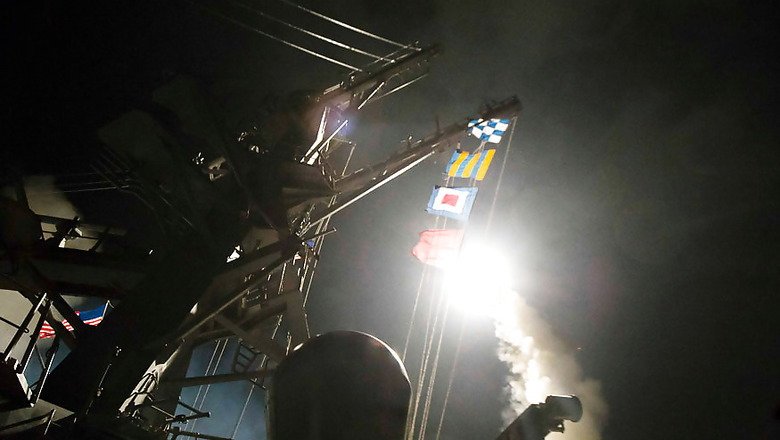
views
Washington: The United States blasted a Syrian air base with a barrage of cruise missiles Thursday night in fiery retaliation for this week's gruesome chemical weapons attack against civilians. President Donald Trump cast the US assault as vital to deter future use of poison gas and called on other nations to join in seeking "to end the slaughter and bloodshed in Syria."Also Read: US Missile Attack on Syria: Here's What You Need to Know
"Assad choked out the lives of innocent men, women and children," Trumped declared.
Syrian state TV reported a US missile attack on a number of military targets and called the attack an "aggression."Also Read: Here's What Led to Trump's Decision to Attack Syrian Airbase
Read President Trump’s full remarks following the US military strikes on Syria https://t.co/ndZqA9fvTm pic.twitter.com/Rg7Aa8qDSN? CNN (@CNN) April 7, 2017
#BREAKING: Statement from @DeptOfDefense spokesman on U.S. strike in Syria - https://t.co/optQFaIv4d pic.twitter.com/6NRbLhbHRp? U.S. Navy (@USNavy) April 7, 2017
A US defense official says the strike on Syria was targeted on runway, aircraft and fuel points https://t.co/gz5j06cnKG pic.twitter.com/e36c98GQGy? CNN (@CNN) April 7, 2017
Before the strikes, US military officials said they informed their Russian counterparts of the impending attack. The goal was to avoid any accident involving Russian forces.
Nevertheless, Russia's Deputy UN ambassador Vladimir Safronkov warned that any negative consequences from the strikes would be on the "shoulders of those who initiated such a doubtful and tragic enterprise."
The #USSPorter and #USSRoss fired #Tomahawk missiles into Syria in retaliation for the Assad regime using nerve agents against its people. pic.twitter.com/Ad908k3oIe? U.S. Dept of Defense (@DeptofDefense) April 7, 2017
He opted instead for a Russian-backed plan that was supposed to remove and eliminate Syria's chemical weapons stockpiles.
Thursday night's strikes were launched from the USS Ross and USS Porter and landed in the early morning Friday in Syria.
Trump seemed to rapidly reconsider his feelings about Assad, saying: "He's there and I guess he's running things, so something should happen."
The show of force in Syria raises legal questions. It's unclear what authority Trump is relying on to attack another government. When Obama intervened in Libya in 2011, he used a U.N. Security Council mandate and NATO's overall leadership of the mission to argue that he had legal authority — arguments that many Republicans opposed. Trump can't rely on either justification here.
Unclear also is whether Trump is adopting any broader effort to combat Assad. Under Obama, the United States largely pulled back from its support for so-called "moderate" rebels when Russia's military intervention in September 2015 led them to suffer a series of battlefield defeats. Instead, Obama sought to work with Russia on a negotiated transition.



















Comments
0 comment